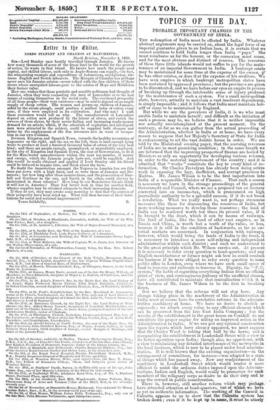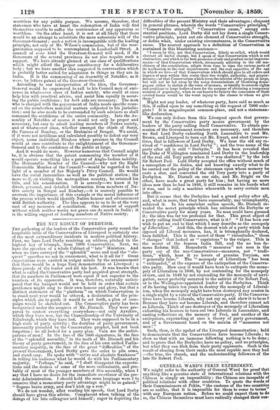TOPICS OF THE DAY.
PROBABLE IMPORTANT CHANGES IN THE GOVERNMENT OF INDIA.
THE redemption of India must be effected by India. Whatever abstract arguments may be carried on, about the legal force of an
imperial guarantee given to an Indian loan, it is certain that we cannot continue to hold India longer than India " pays." She must reimburse us for the honour, or the connexion must cease, and for the most obvious and distinct of reasons, The resources of these three little islands would not suffice to pay for the main- tenance of an imperial Government in India. A bankrupt estate may be maintained for some time at the expense of the owner, he has other estates, or sloes it at the expense of his creditors. We have seen empires in which bankrupt metropolitan states have been sustained by oppressed provinces ; but the provinces are given to be discontented, and we have before our eyes an empire in process of breaking up through the intolerable sense of injury produced by the maintenance of such a system. For a small metropolitan state, however, actually to maintain a vast insolvent dependency, is simply impossible ; and it follows that India must maintain her- self or cease to be maintained by England.
But while we are the governors of India, it is we who must enable India to maintain herself; and difficult as the initiation of
such a process may be, we believe that it is neither impossible nor actually uncontemplated at the present moment. On the contrary, so far as we can gather from the actual proceeding of the Administration, whether in India or at home, we have every reason to suppose that her Majesty's Secretary of State for India is endeavouring to set the vast Asiatic house in order. We are told by the Ministerial evening paper, that the accruing revenues
of India are in most promising condition ; in the same breath WA are informed that the improving prospects of finance are hailed by
Ministers as only an opportunity for developing various reforms,
in order to the material improvement of the country ; and it is admitted that " works " constitute the key to every kind of re-
formation. Sir Charles Trevelyan has already been doing active
work in exposing the lazy, inefficient, and corrupt practices in Madras. Mr. James Wilson is to be the first importation into
India of a responsible Minister of Finance. That such a course is necessary we learn in the strange proceedings of the general Government and Council, where we see a proposed tax on licences converted into an income-tax, which is pronounced on high journalistic authority to be a splendid success, if it do not breed a revolution. What we really want is, not perhaps strenuous measures like these for discounting the resources of India, but
more working measures to develop those resources ; the land of India can be rendered worth ten times its present value, if it
be brought to the front, which it can by means of railways.
The land of India, like the land of other vast empires, as in Russia and China, is worth but a tenth of the value, or less, because it is still in the condition of backwoods, so far as ex-
ternal markets are concerned. In conjunction with railways, however, which would bring the lands of India to the front, it
is necessary to introduce a more self-relying and independent administration within each district ; and such we understand to be the great principle which Mr. Wilson carries out. At present it is necessary to refer every question to head-quarters ; and any English manufacturer or farmer might ask how he could conduct his business if he were obliged to refer every question to some public office in London, even where we have such small space of land to traverse and railroads to traverse it. Dignity, the " P. C. system," the habit of regarding everything Indian from an official point of view, and contemptuous jealousy of the unofficial classes, have all contributed to maintain that centralization which it is the business of Mr. James Wilson to be the first in breaking down.
But we believe that the reforms will not stop here. Any change taking place in the .machinery of the Administration in India must of course have its correlative reforms in the adminis- trative machinery at home. We have no desire to abolish or supersede ; we attach every value to any efficient element which can be preserved from the late East India Company ; but the wrecks of the establishment in the great house on Cornhill do not constitute the proper engine for aiding an improved action in the Administration in India. If we can put any rational construction upon the reports which have already appeared, we must suppose that Sir Charles Wood is taking that bull by the horns, and is reorganizing the establishment in Leadenhall Street with a view to its better operation upon India ; though also, we apprehend, with a view to minimizing any detailed interference of the metropolis in the local business, which is now to be placed under local adminis-
tration. It is well known that the existing organization—in the arrangement of committees, for instance—was adapted to a state
of things which has passed away, Now any readjustment of the machinery in Leadenhall Street which would render it more efficient to assist the arduous duties imposed upon the Adminis- trations, Indian and English, would really be promotion for such members of the reliquary corps as desire to do their duty awl to reap the reward in public consideration.
There is, however, still another reform which may perhaps. have attracted attention at head-quarters, but of which we have as yet no authentic information. The working of the Council in. Calcutta appears to us to show that the Calcutta system has broken down ; even if it be kept up in name, it must be utterly worthless for any public purpose. We assume, therefore, that statesmen who have at heart the redemption of India will find themselves unable to suffer the continuance of any apparatus so worthless. On the other hand, it is not at all likely that there would be an attempt to substitute the mere autocratic will of the Governor-General ; such a notion is incompatible with the leading principle, not only of Mr. Wilson's commission, but of the reor- ganization supposed to be contemplated in Leadenhall Street. A council of some kind the Governor-General will need, if the Governors of the several provinces do not also require such a support. We have already glanced at one class of qualifications which might afford the proper constituency for a deliberative body ; but we have another idea suggested in conversation which is probably better suited for adaptation to things as they are in India. It is the summoning of an Assembly of Notables, as it were, by letters patent of the Governor-General. According to our interpretation of the idea, the Governor- Oeneral would be empowered to call to his Council men of emi- nence in whatsoever class of Indian society, who could at once help him with practical advice, and assist him equally in secur- ing the public confidence ; for both aids are necessary. The man who is charged with the goyernment of India needs specific coun- sel on the numberless material matters subjected to his jurisdic- tion ; and he also needs to be surrounded by such advisers as shall command the confidence of the entire community. Into the As- sembly of Notables of course it would not only be proper and necessary, but easy to admit leading members of Native society, and of whatsoever class, whether amongst the chiefs of Surat, the Parsees of Bombay, or the Brahmins of Bengal. We could, if it were not invidious and calculated possibly to defeat our very object, name individual Hindoos whose presence in the Council would at once contribute to the enlightenment of the Governor- General and to the confidence of the public at large.
And it would do more. However numerous that Council might be, it is obvious that the patent summoning the member of it would operate something like a patent of Anglo-Indian nobility. The Honourable Member of the Council—why not the Bight Honourable Member of the Council ?—would be regarded in the light of a member of her Majesty's Privy Council. He would have the social immunities as well as the political station ; the more so if, on visiting the metropolitan country, he retained his title, and his consideration. It is scarcely—we know it by direct, personal, and detailed information from members of Na- tive society in Bengal and Bombay,—it is scarcely possible to overrate the importance of this example or the moral influence of the process which would identify Native honour and advancement -with British authority. The idea appears to us to lie at the very root of any measures of conciliation. One element of support without which neither works nor grace can do much in India ; it is the willing support of leading members of Native society.



























 Previous page
Previous page